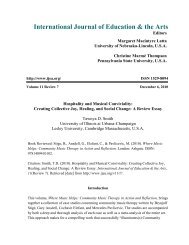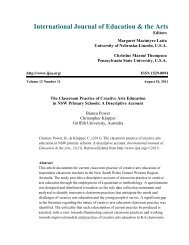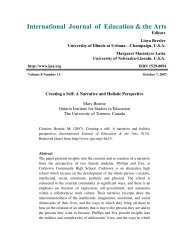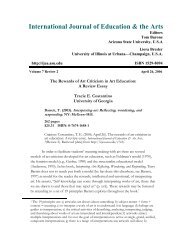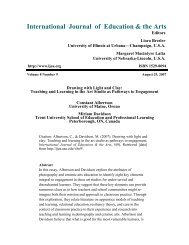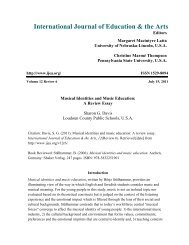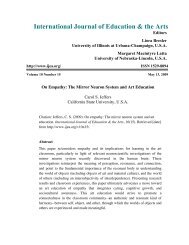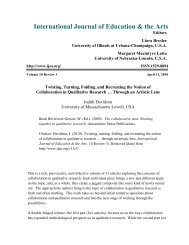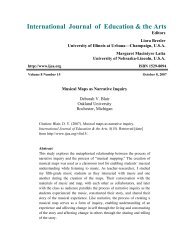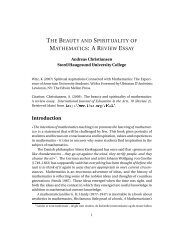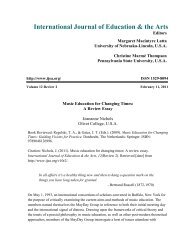Experiences with poetry, pedagogy and participant observation ...
Experiences with poetry, pedagogy and participant observation ...
Experiences with poetry, pedagogy and participant observation ...
- No tags were found...
You also want an ePaper? Increase the reach of your titles
YUMPU automatically turns print PDFs into web optimized ePapers that Google loves.
International Journal of Education & the Arts Vol. 7 No. 1 6potential of impacting directly on individual <strong>and</strong> collective empowerment. They becomemore than empirical data <strong>and</strong> transcend their static destiny as archival documents.” (p. 9).In related fashion, critical <strong>pedagogy</strong> followers/practitioners have also used creativewriting in the classroom as a means through which to question the status quo, deconstructone’s ideas, <strong>and</strong> work towards social change. These too valorize personal experience asexpert knowledge, <strong>and</strong> highlight the relationships between the personal <strong>and</strong> the social <strong>with</strong>a keen eye towards unmasking how power <strong>and</strong> ideology function in this relationship.Words are seen as shaping reality <strong>and</strong> society, so it follows that learning to write in newways could lead to re-thinkings of society. Following Dewey, language recovers itsdynamic power to communicate <strong>and</strong> challenge ideas, rather than simply reproducing theideas of others (Shor <strong>and</strong> Pari, 1999, p. 10).Although the question of empowering students of (relative) privilege who come toMexico to study abroad is exceedingly tricky in terms of power, it is important for students<strong>and</strong> researchers to be able to take ownership of their cultural experiences <strong>and</strong> difficulttimes that occur while in the field. It is equally important to be able to confront the imagesthat the Other makes of Self, <strong>and</strong> these themes will also come up in the <strong>poetry</strong> project.The Poetry ProjectIn the fall of 2004, about a month into the semester abroad, I proposed to mystudents that we form a <strong>poetry</strong> group. I was exploring the theme of “students writingculture” for a panel I was going to be on in the spring, <strong>and</strong> serendipitously, the members ofour small semester group all happened to write stories <strong>and</strong> poems for pleasure at leastoccasionally. They agreed to participate in weekly meetings unconnected to class or otherprogram affairs <strong>and</strong> to bring in their writing 1 to share as a group. I told them that I wouldparticipate not as a teacher, but as a researcher <strong>and</strong> (very nervously) as a writer. Themeetings provided us all <strong>with</strong> a point of intersection that would not have otherwiseoccurred, since despite the small size of the group <strong>and</strong> the fact that it was all-female, therewas considerable diversity <strong>and</strong> a certain respectful distance between the <strong>participant</strong>s. Whilethey were also in a class I taught, it is unlikely any of us would have shared our work <strong>and</strong>our thoughts in this particular way <strong>and</strong> in so much depth.There is a rather long history of previous attempts to incorporate creative work intothe study abroad programs I have directed, however, I had stopped using creative work forseveral reasons. First, while much of the student work was wonderful, much of it was not.Poor work was certainly useful – for example, if at mid-semester, students producedmaudlin, over-romanticized (positively or negatively) portrayals of a culture, this provided agood indicator of where students were intellectually. It could also be argued that while inessays, students can posture <strong>and</strong> orient towards what the teacher wants to hear, in morecreative formats, the tricks are less known, so there is a possibility that an original formmight lead to more authentic / less contrived content. However the question of how toevaluate the quality of their creative work for a grade needed more addressing since moststudents were not formally trained in this sort of writing.



